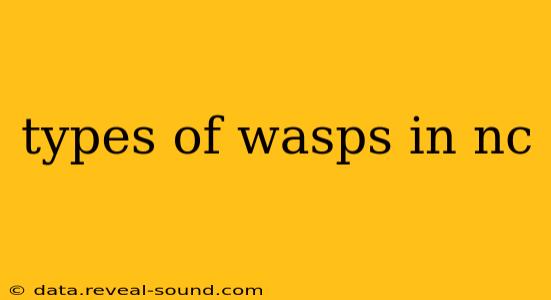North Carolina's diverse ecosystem supports a wide variety of wasp species, some beneficial and others potentially problematic. Understanding the different types of wasps found in NC is crucial for managing potential stings and appreciating their ecological role. This guide explores common wasp species in the state, their identifying characteristics, and behaviors.
What are the Most Common Wasps in North Carolina?
Several wasp families thrive in North Carolina's varied habitats, ranging from urban areas to forests and wetlands. Some of the most frequently encountered include:
-
Paper Wasps (Polistes spp.): Easily recognizable by their slender bodies and long legs, paper wasps build open-comb nests often found under eaves, porch ceilings, or in shrubs. They are generally less aggressive than yellow jackets unless their nest is threatened. Several species exist within North Carolina, differing slightly in coloration.
-
Yellow Jackets (Vespula spp. and Dolichovespula spp.): These highly social wasps are known for their aggressive behavior and painful stings. They build nests underground, in wall voids, or other concealed locations. Yellow jackets are attracted to sugary substances and protein sources, often becoming a nuisance at picnics and outdoor gatherings. Their distinctive yellow and black banding makes them easily identifiable.
-
Bald-Faced Hornets (Dolichovespula maculata): While often called hornets, these are actually a type of yellow jacket. They build large, grayish-white paper nests typically high in trees or shrubs. They are quite aggressive when defending their nests. Their black and white coloration distinguishes them from other yellow jackets.
-
Mud Daubers (Sceliphron spp.): These solitary wasps are less aggressive and rarely sting unless handled. They build distinctive mud nests, often found in sheltered areas like garages, sheds, or under eaves. They are beneficial insects, as they prey on spiders. Different species exhibit varied nest structures and appearances.
-
Cicada Killers (Sphecius speciosus): These large, solitary wasps are impressive in size but generally docile unless provoked. Females dig burrows in the ground to lay eggs, paralyzing cicadas to serve as food for their larvae. Their size and striking coloration are noticeable.
What are the Differences Between Wasps, Hornets, and Yellow Jackets?
Many people use these terms interchangeably, but there are key distinctions:
-
Wasps: This is a broad term encompassing a large group of insects, including paper wasps, yellow jackets, and hornets. They are characterized by their narrow waists and often stinging ability.
-
Hornets: Generally refers to larger, social wasps that build large paper nests. The term is often used loosely and can overlap with yellow jacket classifications. In NC, the Bald-Faced Hornet is the most common example.
-
Yellow Jackets: A specific type of wasp known for their aggressive behavior, often yellow and black banding, and tendency to build nests in concealed locations.
How Can I Identify Wasps in My Yard?
Identifying wasps requires careful observation of their physical characteristics, nest structure, and behavior. Consider these factors:
- Body size and shape: Note the wasp's length, the width of its waist, and the overall body shape.
- Coloration: Pay close attention to the pattern of colors and markings on the body and wings.
- Nest location and structure: The type of nest (paper, mud, underground) and its location provide valuable clues.
- Behavior: Observe how the wasp behaves – is it solitary or social? Aggressive or docile?
If you are unsure about the identification, consulting a local entomologist or pest control professional is always recommended.
Are Wasps in North Carolina Dangerous?
While most wasps are not inherently aggressive, some species, such as yellow jackets and bald-faced hornets, can be dangerous if their nests are disturbed. Their stings are painful and can cause allergic reactions in sensitive individuals. Avoid disturbing wasp nests, and if stung, seek medical attention if you experience severe symptoms.
How Do I Get Rid of Wasps in My House?
Dealing with wasp nests should be approached cautiously. Never attempt to remove a nest yourself unless you are experienced in pest control and equipped with appropriate protective gear. It's best to contact a professional pest control service for safe and effective wasp nest removal.
What Attracts Wasps to My Property?
Understanding what attracts wasps can help in prevention:
- Sweet foods and drinks: Keep sugary substances covered and clean up spills promptly.
- Garbage: Dispose of trash regularly and securely.
- Standing water: Eliminate sources of standing water to discourage insects.
- Flowers and plants: While wasps are attracted to nectar, minimizing flowering plants near your home can help.
By understanding the various types of wasps in North Carolina and implementing preventative measures, you can coexist peacefully with these fascinating insects while minimizing the risks associated with their presence. Remember to always prioritize safety when dealing with wasps and their nests.
